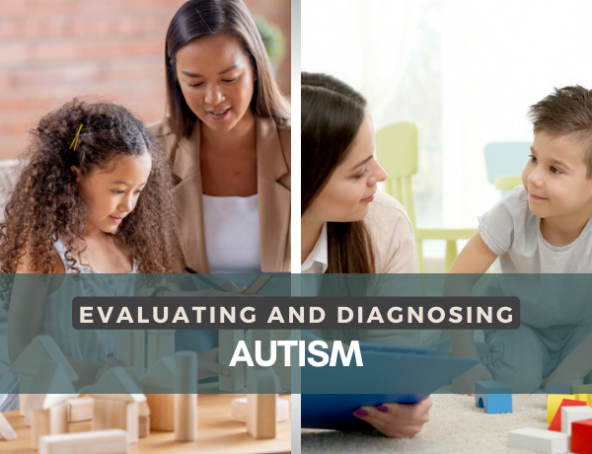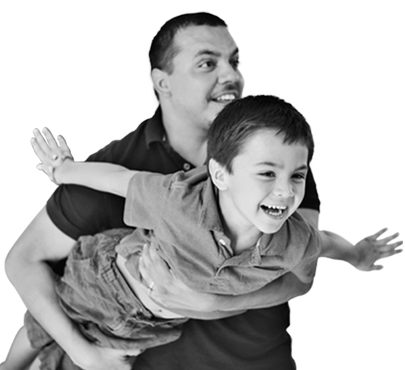Evaluating and Diagnosing Autism

An Overview of the Diagnostic Process
Autism Spectrum Disorder (ASD) is one of the most common developmental disorders in the world. In 2020, the CDC reported that approximately one in 54 children in the US is diagnosed with ASD, affecting one in 34 boys and one in 144 girls. Autism is receiving a lot more attention from the media and medical professionals these days, leading many parents of young child to wonder, does my child have autism?
Doctors have defined ASD as a neurodevelopmental condition that can impact communication, sensory processing, and social interactions. Although recent research has advanced our understanding of autism, much remains unknown about its cause. A multi-year study is underway to learn more about these factors, such as gene variants, environmental toxins, and the intestinal microbiome, all of which are potentially linked to autism.
Diagnosing ASD can be challenging. There is no specific medical procedure (such as a blood test) to diagnose the disorder. Since ASD covers a broad spectrum of symptoms and behaviors, patterns behaviors can look drastically different for each individual child.
The Importance of a Diagnosis
For most parents, learning that your child has ASD can be upsetting, confusing, and frightening. So much remains unknown about the condition, and parents understandably worry about saddling their child with a label. However, screening, evaluating, and diagnosing children with ASD as early as possible is vital to ensure that they receive the services and accommodations they need to reach their full potential. Early intervention treatment programs can improve learning, communication, and social skills, as well as alter underlying brain development.
Each child is unique and treatment programs should always be individualized, but a diagnosis provides clinicians with direction and a general framework to determine which options are most likely to reduce functional impairments and improve an individual’s quality of life. In many cases, a diagnosis is necessary to qualify for government funding or insurance coverage to receive critical services and therapies.
How the Diagnostic Evaluation Process Works
AZA United offers Diagnostic Evaluation Services for individuals with autism and other special needs of all ages. Our program provides four levels of individualized assessments tailored to each person’s unique needs. The goal is to capture as much information as needed to determine an accurate diagnosis that will lead to the most effective services and supports.
Level 1 – Basic Evaluation
Typically the basic evaluation is used to assess very young children or older individuals who want a simple evaluation and do not have other formal psychiatric/medical diagnoses. The basic evaluation includes interviews, questionnaires, and direct assessment and observation. For children under the age of seven, a video of their behavior may be requested. A basic evaluation generally takes approximately four to six hours (includes interviews and direct assessment). The results are frequently shared with the family on a separate day.
Level 2 – Intermediate Evaluation
The intermediate evaluation tends to be most appropriate for school-aged children or individuals seeking a slightly more extensive assessment. For example, for children under the age of seven, a video of their behavior may be requested, and consultation with other providers or school observations may be scheduled. In most cases, an intermediate evaluation can be completed in one assessment day, with interviews scheduled prior to the direct assessment and results shared on a separate day.
Level 3 – Complex Evaluation
The complex evaluation is most suitable for adolescents (i.e., ages 13-18) or individuals with a more detailed history or complex behaviors. A complex evaluation is thorough and may include a record review, consultation with others, and a school observation. In addition, a multidisciplinary assessment may also be suggested to determine a diagnosis.
Complex evaluations are generally completed over one to two assessment days (i.e., three to four hours per day), with interviews scheduled prior to the direct assessment and results shared on the final day. However, additional assessments may be needed after the initial testing is complete, so there may be up to a week between assessment days.
Level 4 – Comprehensive Evaluation
A comprehensive evaluation is generally necessary for adults (age 18 and above) or individuals who have a very complicated psychosocial history and many emotional, behavioral, or psychological symptoms. A school observation, record review, consultation with other individuals, and a multidisciplinary evaluation may be recommended to determine a diagnosis.
Comprehensive evaluations typically take place over one to two assessment days and span four to five hours per day, with interviews scheduled prior to the direct assessment and feedback regarding the evaluation results scheduled after the evaluation. The need for additional assessments may be determined after the initial day of testing, so there may be up to a week between assessment days.
How to Get Help
If you suspect your child has autism, or your child has ASD and is living in Arizona, Arizona Autism United can provide services and resources to help.
As a nonprofit community-based organization, we offer a wide variety of supports, services, and programs for individuals, families, schools, and the community. Our team of experienced clinicians works in partnership with parents to help children progress toward their goals and each family’s personal priorities. We also offer a Mental Health Counseling program to support individuals, families and couples seeking therapeutic support.
Receiving an autism diagnosis is a challenging experience for any parent or a caregiver to receive, but it certainly does not mean anything is "wrong" with your child. Everyone is different, everyone has gifts to offer, and all that matters is helping each child reach their potential. Receiving individualized interventions and supports at any stage of the journey is the key to helping each person achieve their definition of success.
Contact our Family Support Team if you would like to learn how to get started with the Diagnosis Process or any other programs and services that we offer. Our Family Support Team is always available to help and is available at no charge to all members of the autism and developmental disability community. Schedule a free phone appointment that works with your schedule by visiting azaunited.org/supportcall
You may also be interested in:

 For more helpful resources and information, follow AZA United on social media:
For more helpful resources and information, follow AZA United on social media:






